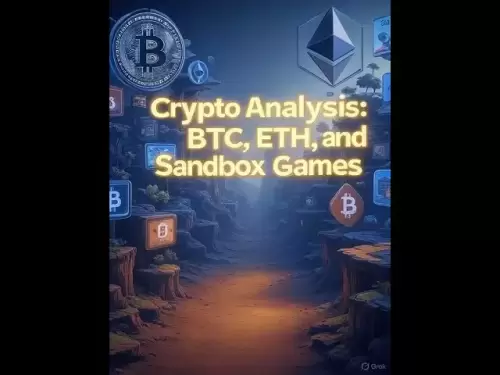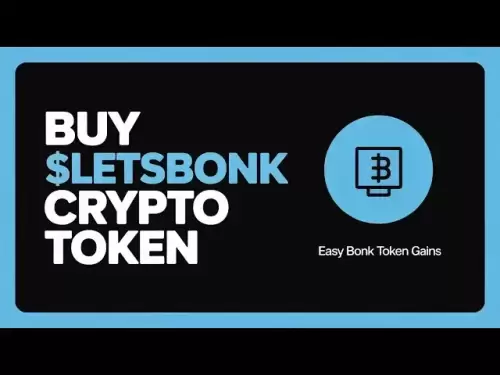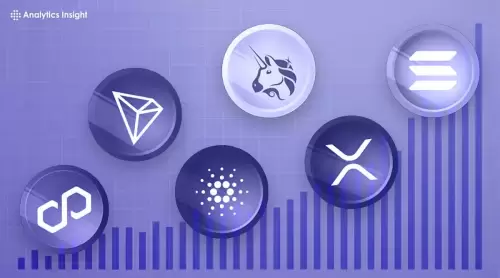 |
|
 |
|
 |
|
 |
|
 |
|
 |
|
 |
|
 |
|
 |
|
 |
|
 |
|
 |
|
 |
|
 |
|
 |
|
Cryptocurrency News Articles
Ethereum, Cardano, and Whale Alerts: Separating Fact from Crypto Fiction
Jul 19, 2025 at 03:35 am
Navigating the crypto landscape requires accurate data. We dissect a Whale Alert mishap involving Cardano and explore Ethereum's institutional appeal.

The world of crypto moves fast, and keeping up with Ethereum, Cardano, and those infamous Whale Alerts can feel like deciphering ancient runes. Let's break down recent buzz, separating fact from fiction.
Cardano's Close Call: When a Whale Alert Went Wrong
Recently, Whale Alert, a well-known blockchain monitoring service, raised eyebrows with a reported Cardano transaction fee of a whopping $3.7 million ADA. Cue the collective gasp from the crypto community! But hold on, folks, because things aren't always as they seem.
Turns out, it was a bit of a boo-boo. The actual fee was a minuscule 1.6 ADA, roughly $0.83. Ouch. Josh Marchand, founder of SecurityBot, didn't mince words, calling the initial report “completely false.” This little incident highlights the importance of accuracy in crypto analytics. Cardano's unique UTXO model and fee structure differ from Ethereum's, meaning data interpretation requires network-specific expertise.
The lesson here? Always double-check your sources, especially when dealing with complex blockchain data. A little collaboration between monitoring services and blockchain communities can go a long way in maintaining transparency and trust.
Ethereum's Institutional Embrace: Bit Digital's Big Bet
While Cardano dodged a bullet with the Whale Alert mishap, Ethereum continues to solidify its position as a darling of institutional investors. Bit Digital, for instance, has been aggressively expanding its Ethereum holdings, now boasting around 120,306 ETH. They're not alone. Other companies like SharpLink Gaming and BitMine Immersion are also increasing their Ethereum stakes.
Why the Ethereum love? Bit Digital sees Ethereum as “the backbone of future digital finance,” citing its flexibility, rising adoption, and staking rewards. They view Ethereum as more than just a crypto asset; it's a platform powering stablecoins, tokenized assets, and decentralized apps. This bullish sentiment is reflected in Ethereum's price, which has seen a significant rise, fueled by growing institutional interest and the anticipation of ETH ETFs.
The Contrasts and The Convergence
While one blockchain is navigating data accuracy challenges, the other is basking in institutional favor. Ethereum’s higher transaction fees, sometimes spiking due to network congestion, stand in stark contrast to Cardano's aim for predictable and cost-effective fees. This disparity highlights the diverse approaches blockchains are taking to address scalability and usability. But both are pivotal in the decentralized landscape.
My Take: Data Integrity and Strategic Investments
The Cardano/Whale Alert situation underscores the need for greater scrutiny and collaboration in blockchain analytics. Data providers must prioritize accuracy, engaging with network-specific experts to ensure reliable reporting. On the other hand, Ethereum's appeal to institutional investors signals a growing confidence in its long-term potential as a foundational technology for decentralized finance. Personally, I think both Ethereum and Cardano have bright futures, provided they address their respective challenges.
For example, if Cardano continues to focus on low transaction fees and scalability, it could become the go-to platform for microtransactions and everyday use cases. Simultaneously, Ethereum's robust ecosystem and institutional backing position it as a leader in decentralized finance and enterprise applications. This isn't financial advice, just my two cents!
Wrapping Up: A Crypto Rollercoaster
From misreported transaction fees to massive Ethereum investments, the crypto world is never dull. It’s a wild ride filled with opportunities and challenges. So, buckle up, stay informed, and remember to take those Whale Alerts with a grain of salt. After all, in the world of crypto, things are always subject to change. Keep your eyes peeled, and who knows what the next headline will bring!
Disclaimer:info@kdj.com
The information provided is not trading advice. kdj.com does not assume any responsibility for any investments made based on the information provided in this article. Cryptocurrencies are highly volatile and it is highly recommended that you invest with caution after thorough research!
If you believe that the content used on this website infringes your copyright, please contact us immediately (info@kdj.com) and we will delete it promptly.




























































